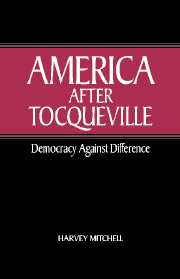Book contents
- Frontmatter
- Contents
- References to Tocqueville's Democracy in America
- Preface
- I PATHS TO DEMOCRACY IN AMERICA
- II BEGINNINGS AND DEMOCRACY
- 4 Beginnings and History: Red and White in Tocqueville's America
- 5 The New England Township Before the Revolution: Tocqueville's American Pastoral
- 6 A Second Beginning: Black and White in Tocqueville's America
- III AMERICAN DEMOCRACY ON TRIAL
- 10 Conclusion
- Works Cited
- Index
5 - The New England Township Before the Revolution: Tocqueville's American Pastoral
Published online by Cambridge University Press: 10 August 2009
- Frontmatter
- Contents
- References to Tocqueville's Democracy in America
- Preface
- I PATHS TO DEMOCRACY IN AMERICA
- II BEGINNINGS AND DEMOCRACY
- 4 Beginnings and History: Red and White in Tocqueville's America
- 5 The New England Township Before the Revolution: Tocqueville's American Pastoral
- 6 A Second Beginning: Black and White in Tocqueville's America
- III AMERICAN DEMOCRACY ON TRIAL
- 10 Conclusion
- Works Cited
- Index
Summary
History, American history, the stuff you read about in books and study in school, had made its way out to tranquil, untrafficked Old Rimrock, New Jersey, to countryside where it had not put in an appearance that was notable since Washington's army twice wintered in the highlands adjacent to Morristown. History, which had made no drastic impingement on the daily life of the local populace since the Revolutionary Wars wended its way back out to these cloistered hills.
Philip Roth, American Pastoral, p. 87One had the impression of a process of ceaseless gradation.… The last word never seemed to be able to be uttered, for every end was a beginning, every last result the first of a new opening.
Robert Musil, The Man Without QualitiesThe New England township was, from its inception, imbued with a sacred quality. In its founding lay the promise of a new society. Unfettered by the religious or political tyranny of the Old World, it would nurture a spirit of intense community loyalties through active neighborly participation, and hold at bay the disorderliness characteristic of imperfect societies. The limitations of the past would not cast a shadow on hopes for an abundant spiritual and material future. Nothing from the outside world would be permitted to destroy its tranquillity. Neither an oppressive religion, nor the king's arbitrary powers, nor the hostile savages in the countryside surrounding it would deter it from its course.
- Type
- Chapter
- Information
- America after TocquevilleDemocracy against Difference, pp. 114 - 131Publisher: Cambridge University PressPrint publication year: 2002



